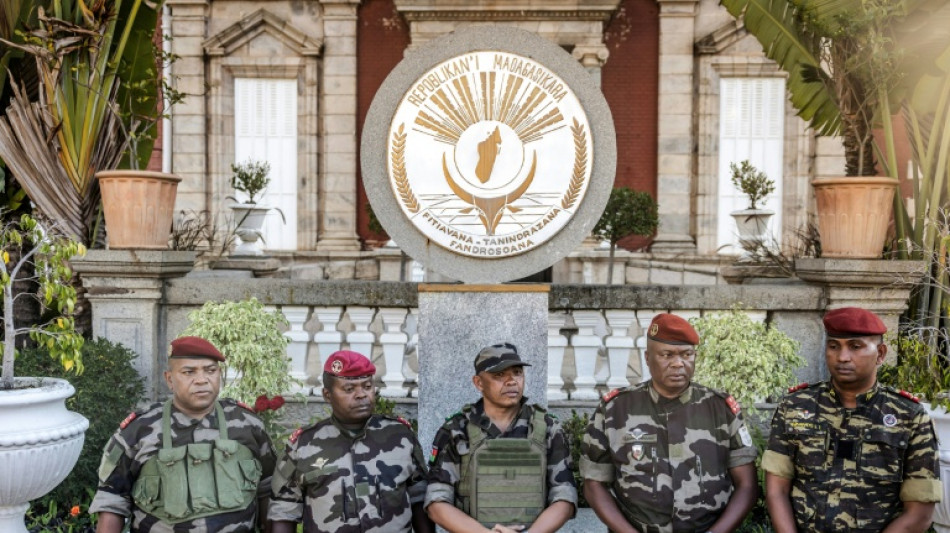

Army colonel sworn in as Madagascar president
Army colonel Michael Randrianirina was sworn in as Madagascar's president Friday, just days after a military power grab that sent ex-president Andry Rajoelina fleeing and raised international alarm about a new coup on the island.
Randrianirina led the CAPSAT army unit that mutinied and joined anti-government protesters before announcing the military had taken over after Rajoelina was impeached for desertion of duty on Tuesday.
"Today marks a historic turning point for our country," he said after taking the presidential oath.
"We will work hand in hand with all the driving forces of the nation to draft a fine constitution... and to agree on new electoral laws for the organisation of elections and referendums," he said.
He also thanked the youth for spearheading the protests that ousted Rajoelina and said the army had intervened at the request of the top court to "avoid anarchy and disorder".
The ceremony in the capital Antananarivo was attended by military officers, politicians, representatives of the Gen Z youth-led protest movement and several foreign delegations including from the United States, the European Union, Russia and France.
Amid international criticism, including from the United Nations, Randrianirina has been eager to officialise his new role and insisted the takeover was not a coup, pointing to the constitutional court's backing.
He has pledged elections in 18 to 24 months and on Thursday told local media that the country wouldn't be led by a military regime but that "the government belongs to civilians".
The 51-year-old colonel swapped his army uniform for a suit at Friday's swearing-in ceremony where he addressed the foreign delegations in French, inviting them to "accompany Madagascar in the process of steering and implementing national renewal".
"We are committed to breaking with the past," Randrianirina said. "Our main mission is to thoroughly reform the country's administrative, socio-economic and political systems of governance."
- Ex-president in hiding -
Rajoelina's supporters have condemned the constitutional court's support of the CAPSAT commander as riddled with procedural illegalities that risked destabilising the former French colony.
They insist that Rajoelina remains leader and is working to find solutions to the problems dogging the impoverished island, including power cuts that sparked a youth-led protest movement on September 25.
Government forces were accused of a harsh crackdown on the protesters, with many reported dead or wounded, until CAPSAT announced on October 11 that it would refuse orders to shoot on them.
It marked a turning point in the uprising, with the unit hailed by the protest movement which now expects a role in the new set-up.
Rajoelina's office confirmed in a statement late Wednesday that he had fled the country the same weekend CAPSAT stood behind the protesters, saying he feared for his life. He has not revealed his whereabouts.
Media reports said the 51-year-old was evacuated on Sunday aboard a French military plane that took him to the French island of Reunion from where he travelled to Dubai.
Madagascar is the latest of several former French colonies to have fallen under military control since 2020, after coups in Mali, Burkina Faso, Niger, Gabon and Guinea.
It is the third military transition in Madagascar since independence in 1960, following coups in 1972 and in 2009.
The country, off Mozambique, is one of the poorest in the world, despite an abundance of natural resources and a rich biodiversity.
About 80 percent of its roughly 32 million people live in poverty, according to the World Bank's benchmark.
Rajoelina's escape is the third time an ousted Malagasy head of state has left the country. Didier Ratsiraka fled to France in 2002 after post-electoral violence and Marc Ravalomanana went to South Africa in 2009.
The African Union and regional SADC bloc said they would send fact-finding missions to the island and called for constitutional democracy to be upheld.
"The transition is now under way. We call for the full involvement of civilians in the ongoing process," French Foreign Minister Jean-Noel Barrot said Thursday.
"The mobilisation of Madagascar's youth must be fully heard to build a sustainable, peaceful and calm solution," he told reporters during a visit to Nigeria.
V.Bellini--GdR

